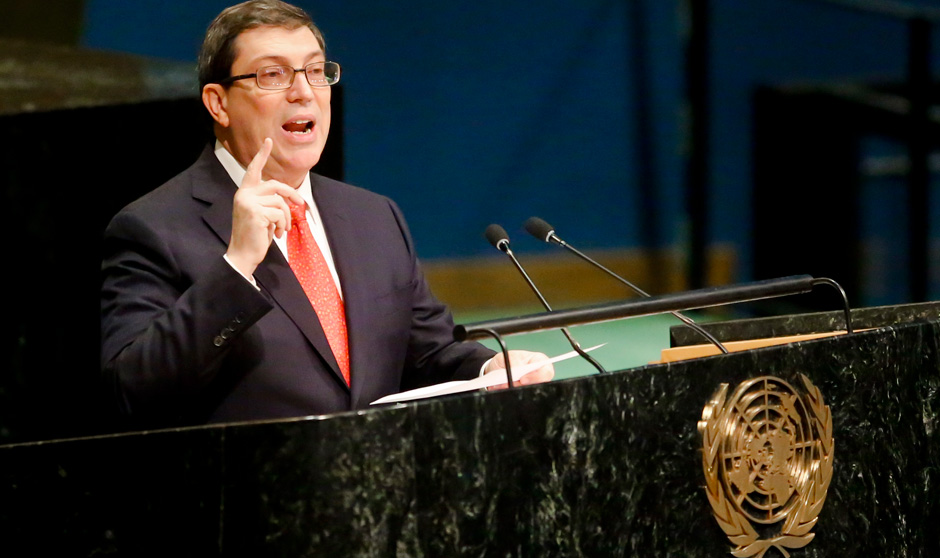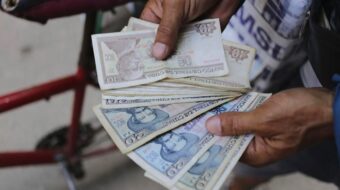
Annually for 25 years, the United Nations General Assembly has voted overwhelmingly for an end to the U.S. economic blockade against Cuba. The nations of the world vote again on November 1, 2017. Last year, the United States and Israel abstained, but all other nations voted “No” to the blockade.
In preparation for the vote, Cuba’s foreign ministry every year prepares a report detailing adverse effects of this U.S. policy. The report for 2017 is a 47-page document, accessible here. It begins: “The economic, commercial, and financial blockade imposed by the Government of the United States against Cuba for almost 60 years still persists, continues to cause suffering to the Cuban people, and obstructs the economic development of the country.”
Concentrating on Cuba’s experience between April 2016 and June 2017, the report claims that Cuba’s “situation began to worsen” under the Obama administration, despite diplomatic relations having been restored. Increasingly, the United States imposed fines “on foreign companies that maintained commercial relations with Cuba.” Fearing such, many international financial institutions don’t deal with Cuba. The U.S. Treasury Department in early 2016 ruled that Cuba could use U.S. dollars in international transaction. But that opening hasn’t been implemented.
Cuba calculates that over the decades the blockade has caused losses of $822.2 billion, an amount reflecting dollar devaluation. Losses in terms of current value are $130.2 billion. The blockade has caused Cuba $4.3 billion in losses since April 2016. The totals represent costs associated with obtaining goods in third countries and income lost due to prohibitions on sales to the United States. The losses dwarf the billions of dollars Cuba must seek out as direct foreign investment. The disparity casts light on the precariousness of Cuba’s prospects for economic development.
The impact of President Obama’s reforms was limited. As his presidency ended, state enterprises were still barred from exporting to and importing from the United States. New allowances for telecommunications equipment amounted to only a minor exception. U.S. citizens still can’t freely travel to the island. Cuban businesses are still unable to open accounts in U.S. banks. Cargo ships still can’t enter a U.S. port within six months of visiting a Cuban one.
The report cites 18 “main blockade measures” imposed since May 2016. Here’s an example: “On June 8, 2017, [the U. S. Treasury Department] imposed a $87,255 fine on the company American Honda Finance Corporation (AHFC) because one of its subsidiaries in Canada—Honda Canada Finance Inc.—approved and financed 13 vehicle leasing agreements between the Cuban embassy in Canada and a concessionary of Honda in Ottawa between February of 2011 and March of 2014.”
The report documents eight instances of U.S. interference with the “Right to Health and Food.” For example, “Cuban hospitals cannot have any state-of-the-art technology or equipment that is exclusively manufactured in the United States… Cuba [therefore] had to send a group of patients and their companions to foreign hospitals, at a cost of $1,066,600.” Unable to import drugs and medical equipment from the United States, Cuba finds them in third countries. Doing so, Cuban importers pay marked-up prices and additional charges for insurance, freight, storage, and payments to intermediaries. The extra spending on health care amounted to $87 million during the most recent year.
That year, Cuba’s food sector lost almost $348 million. Cuban food manufactures import 70 percent of the equipment and raw materials they need. Having to rely on distant sources adds expense and requires Cuba to accumulate large inventories.
Blocked from importing education supplies from the United States, Cuba paid almost $3 million to obtain them in third countries. The blockade hinders educational exchanges, deprives schools and universities of U.S.-licensed computer software, and causes shortages of laboratory equipment.
Blockade regulations interfere with Cuba’s sports programs and cultural and artistic projects by forcing them to secure specialized equipment abroad at additional cost—if it can even be obtained. Cuban artists don’t receive adequate payments—sometimes nothing—for performances and sales in the United States, including recordings and films.
The report provides dozens of examples of impediments to Cuba’s development. New equipment for refashioning the island’s water system—there’s been serious drought—is often unavailable. Cuba’s large biomedical industry must cope with shortages of materials and equipment. Cuba’s mining, chemical, alternative energy, telecommunications, metallurgy, construction, and aviation industries lack access to U.S. sources of new or replacement equipment. They look elsewhere, and at great cost.
Cuba’s relations with third-country banks and corporations went awry long ago. The report emphasizes that the “blockade is not a bilateral issue between the United States and Cuba. Its extraterritorial character persists and is fully implemented, with absolute impunity and in open violation of International Law.”
Today’s global economy is interconnected. Many U.S. companies have associations with multinational corporations, and they deal with banks throughout the world. When those larger entities or their foreign subsidiaries serve Cuba, they provoke U.S. retribution, courtesy of the blockade.
The report relates instances of foreign banks sanctioned for handling Cuba-related transactions, of Cubans unpaid for goods or services provided overseas, and of U.S. hospitals and physicians going without Cuban bio-medical products.
Solidarity projects and anti-blockade campaigns are surveyed worldwide, among them: U.S. congressional lobbying, pressure from business groups, local actions, and statements from foreign notables, parliamentarians, and international organizations.
The authors are blunt in their claims: “The blockade continues to be a massive, flagrant, and systematic violation of the human rights of all Cubans and qualifies as an act of genocide.” And, “This policy continues to be the only obstacle to the development of the Cuban economy.”
Compared to past reports, this one doesn’t say much about national sovereignty and international law. Implicitly, however, the document appeals to the Geneva Conventions, which say that combatants fighting a war must protect non-combatant civilians. There’s no armed conflict between the United States and Cuba, yet Cuba’s civilians are under siege.












Comments